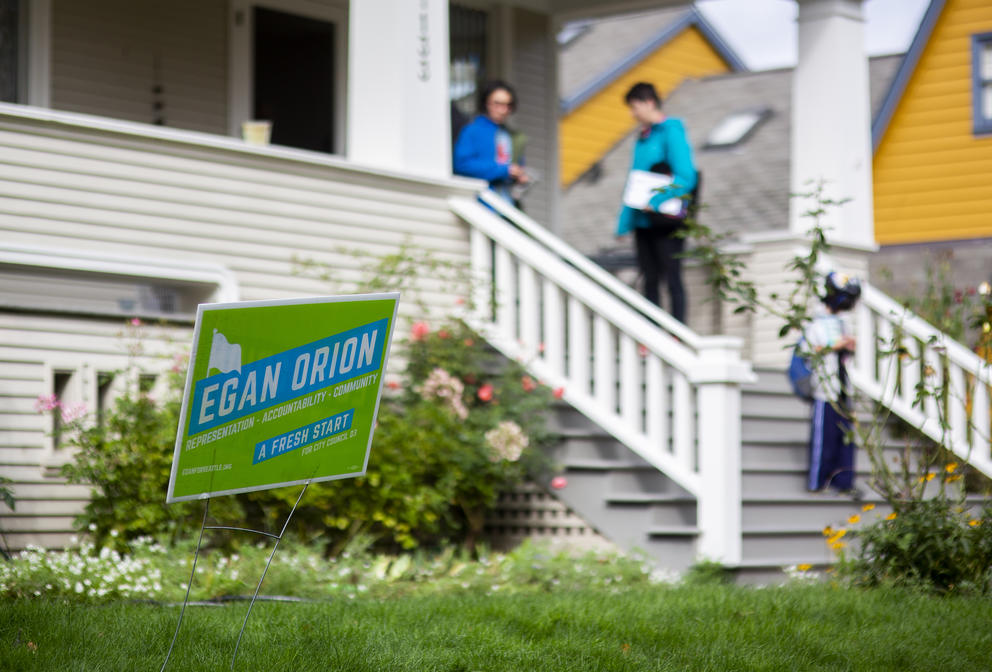As she runs for a third term in 2019, the recent defining moment for the Socialist Alternative council member ended not in a victory, but an ugly defeat. After its unanimous adoption in 2018, a “head tax” on big Seattle businesses championed by Sawant was repealed a month later in the face of negative polling and a likely ballot referendum. Sawant was one of two council members — along with Teresa Mosqueda — to oppose rolling it back.
Sawant says there have been victories as well, but she brings up the tax's implosion at every opportunity, willingly stepping into the long shadow the contentious fight has cast over this year's elections and using it as a boon for her campaign.
“I don't think the conclusion should be ‘big business is angry at us, what should we do?’ ” said Sawant. “It should be a realization that, yes, when you go against a powerful establishment, they're not going to accept it.”
But for Sawant — Seattle's most famous and debated politician — the path to reelection is now steeper. After winning 52% in the 2015 primary, she won just under 37% this year. And though her District 3 — which includes Capitol Hill, Madison Valley and parts of the Central District — has gained thousands of voters over the past four years, Sawant's total vote tally in the primary ticked upward only slightly.
She faced more primary candidates this time than last, none of whom were considered nearly as far left as Sawant, but who were able to siphon votes from her base.
Since at least 1997, no incumbent council member has received less than 37% of the vote in a primary and gone on to win, according to city records. The closest was Richard McIver, who won 39% in the 2005 primary and won in November. But others who performed better than Sawant in the primary have then gone on to lose — including Margaret Pageler (38.9%) and Heidi Wills (43.6 %) during 2003's "strippergate" scandal. (Wills is running for council again, this year, in District 6.)
Sawant's opponent this year is Egan Orion, an events coordinator, web designer and leader of PrideFest, an annual LGBTQ celebration in Seattle. He's fully embraced a unity message, campaigning on a message of "It’s not us vs. them. It’s just us."
The message echoes past election attacks against Sawant: She doesn't collaborate, she grandstands, she's "divisive." Sawant, for her part, has been consistent in her message since she was first elected in 2013, that it’s necessary to pick sides. The success or failure of Sawant's campaign, then, becomes this year's purest test to see whether and how much Seattle today differs from Seattle in 2015.
Asked why she underperformed her 2015 numbers so much in this year's primaries, Sawant said the "establishment" is taking her more seriously. That may well be true. Spending by independent political action committees is way up, with new groups like "People for Seattle" — led by former Councilmember Tim Burgess — raising hundreds of thousands of dollars. Orion has been one of the main beneficiaries of those committees, despite his stated belief that the campaign finance system is problematic.

In the telling of Sawant and her campaign volunteers, the race is a binary choice between heroes and villains, a framework the campaign adheres to as volunteers visit the doorsteps of would-be voters.
"We know that the movement has its work cut out for it," Sawant said. "At the same time I have to say I have not seen this much clarity on the part of the vast majority of people [on] what this election is about. This election is about who gets to run Seattle: working people or big business."
For Orion, though, the explanation is more simple: People are ready for something new. “Every single day I convert Kshama supporters at the door,” he said. “They're like, ‘Oh, I voted for her the last two times and I'm just done.’ ”
‘It’s just us’
Orion told Crosscut his professional experience has equipped him to understand the perspectives of small business owners. After initially telling the Stranger he would not seek the endorsement of the Seattle Metropolitan Chamber of Commerce, he said he reconsidered after hearing from people who disagreed with this decision.
"The businesses that I've been working with for years on Capitol Hill were like, 'We're part of this chamber too, right?' " he said.
“I know the headwinds that small businesses face and I know some of the big issues,” he added. “Having been a small business advocate the last couple of years, I've gotten intimate with those issues.”
Orion’s website displays endorsements from the real estate and hospitality advocacy organizations, and he says he’s more willing to entertain those industries' complaints than most of the sitting council. In a recent interview, he said he disagreed with the council's approach to regulating businesses affiliated with hotels — "ancillary" businesses like restaurants that are in the lobby — as part of legislation protecting hotel workers.
He opposes a return of the “head tax” on large businesses to pay for homeless services and housing, and is not as bullish on certain tenant protections. He said legislation to cap move-in fees charged to renters, which Sawant fought for, is "highly problematic" because it could push landlords to raise rents.
On policing, he has emphasized improving retention and recruitment of officers, which has lagged, and sides with Mayor Jenny Durkan when it comes to moving forward with federally mandated reforms, arguing that flaws identified by a federal judge should be satisfied in the next round of union contract negotiations. He said reopening collective bargaining with the police unions, as some council members have suggested, is not the right path to satisfy the federal judge, who oversees police reform in the city.
In general, Orion believes that when it comes to homelessness and housing, the city could do better with what it already has.
But Orion's politics occasionally veer from their relatively center-left bearing, so far as to align with his opponent. Orion supports taking out $500 million in bonds to build housing for those who've struggled the longest with homelessness. When asked how those loans would be repaid, Orion said the city could pay it off by dipping into the general fund over a number of years. Only one other council member has proposed such an aggressive use of the city or King County's credit card: Sawant, repeatedly, including last year, when she called for $480 million in bonds to be repaid via a new revenue source.
Budget keepers have discouraged such a large proposal as a risk to Seattle's credit rating. But Orion said it's a necessary step because homelessness is a crisis. In Orion's view, Sawant failed because she could not persuade other council members to join her. He presents himself as better equipped to build political support in City Hall. "She didn't have the support from other council members because it was a half-baked plan. You have to build a coalition. That's how politics works."
Raised in Auburn, Orion, who is gay, moved to Capitol Hill in the early 1990s seeking a "refuge." The neighborhood at the time drew young, gay people from around the Northwest. To hear Orion tell it, his path through life was largely spontaneous — traveling, working odd jobs, taking up web design for a Hawaii-based company called Clone Your Bone, which made penis-casting kits.
He worked for Microsoft in the early 2000s before shifting to event planning, mostly for nightclubs. When "flash mobs" — spontaneous, coordinated public dancing — became a thing in the ’00s, he coordinated them for companies as a form of advertising. And he took the reins of Seattle's PrideFest. More recently he worked for the Broadway Business Improvement District, a city-backed revitalization initiative with a small taxing authority.
"The way that I sort of embark on things that I do is that I'm never really looking at what the next step is and that it's sort of an end to itself," he said.
With his long history in the district, Orion is doing his best to cast himself as a member of the community who will do the little things — similar to other candidates, like Alex Pedersen in District 4, who are seeking wholesale change on a "back-to-basics" message. The argument they offer is that council members have their heads in the clouds. Part of that is a promise that Orion will be the candidate who will follow the lead of community members and collaborate with colleagues.
"You know, we're constantly talking about in this race, 'Oh, Kshama is a movement leader,' " Orion said. "And, you know, I believe in movement as well. But when you are a representative in a district system for Seattle City Council, movements are not terribly effective for the day-to-day lives of all the people that live in the district."
That's exactly the message his supporters want to hear. "It’s not us-versus-them, it’s just us, which frankly is how the nonpartisan city council is supposed to behave," said state Sen. Jamie Pedersen, D-Seattle, whose district includes Capitol Hill. Sawant briefly and unsuccessfully ran against him for a state legislative seat in 2012. "They’re there to solve problems in front of the city and not to be making punching bags" of those who disagree.
‘I’m not unique’
This oft-used attack on Sawant — that she doesn’t play nice with others — doesn’t land with her supporters. "She doesn't say, 'Oh, well, you know, we have to all get along.' Well, I don't really want her to get along," said Kathy Yasi, a child care provider in the Central District mingling one afternoon in Cal Anderson Park, as about 30 Sawant volunteers pumped themselves up to knock on doors for their candidate. "I want her to say, ‘What the hell is happening? Why is this this way?’ And I can count on her to do that."
Sawant herself is not shy about her distaste for cooperation for its own sake.
"I think everybody collaborates or doesn't collaborate depending on what their objectives are, so in that sense I'm not unique," Sawant told Crosscut. The difference with her, she said, is she works to build grassroots coalitions — often appearing at City Hall with large crowds of red-shirted supporters — rather than relationships with big business. She also said she works well with some of the council's more progressive members, such as Councilmember Lisa Herbold, on tenant protections.
Sawant and her campaign knows her path to reelection isn't easy, but they're betting that, by presenting it as a choice between Sawant and corporate spending, the voters who strayed during the primary will find their dislike of independent expenditures more powerful than any disagreements with Sawant.
"We've been hearing a lot at the doors from people who voted in the primary that they don't want a corporate PAC to buy this election, that they have their disagreements with Kshama's style or even on specific policies, but at least she's up front and they know what they're getting, and they know that it's clear what Kshama stands for," said Bryan Koulouris, Sawant’s campaign manager.

But while Sawant's volunteers like to point out that she had a larger share of the vote than any candidate in the primary, identifying her ceiling of support is difficult. No politician is better known in Seattle than Sawant, meaning nearly two-thirds of voters knew who she was and still decided to vote against her in the primary. Orion, on the other hand, is still introducing himself.
A Ph.D. economist from India, Sawant swept into power in 2013 on her call to raise the minimum wage, shocking then-incumbent Richard Conlin. Sawant, as the first socialist to win a citywide Seattle election in nearly a century, became a national figure overnight.
She quickly gained a reputation as agitator-in-chief, deploying tactics in City Hall that echo those of tense labor negotiations.
When listing Sawant's achievements on the council, supporters often point to the minimum wage win and new tenant protections, such as the requirement that landlords bring their apartments up to code before they can raise rents, as well as the cap on move-in fees. Sawant also points to the $29 million in housing bonds the city took out in 2016.
More recently, many of her fights are about stopping something from happening — the repeal of the head tax, approval of a new contract for rank-and-file police officers. Especially in the latter part of her second term, Sawant has taken on individual battles over certain properties or people, quixotically trying to "save" the Showbox theater, an apartment building in the Central District, an Ethiopian restaurant and a mobile home park.
But if the fight over a $15 minimum wage was the issue she rode in on, the call for rent control has taken over as this year's most salient issue for her campaign. It also represents the perfect wedge between her supporters and her skeptics.
Rent control is illegal in Washington, which means the city council cannot restrict rent hikes. When asked if there was any momentum to repeal that ban in the Democrat-dominated state Legislature, Sen. Pederson said bluntly, "No. It’s just ridiculous, ridiculous, ridiculous. She knows better than anyone else that the city has no ability to do rent control."
Pedersen added that, because of Sawant’s efforts on rent control, the Legislature has cooled to the idea of relaxing any local preemptions — policies set by the state that can’t be changed by cities — including Seattle's ability to regulate guns, which Pedersen supports. Olympia fears that given an inch, the city will take a mile.
"All over the state they run against the Seattle City Council," Pedersen said.
But in Sawant’s view, without a challenge from the city council, rent control will remain as dead as it has been. "What we're doing is not an attempt to come up with some clever trick around the statewide ban," she said. "The question is, how do we fight against that ban?"
Anyone who might think the soft vote numbers would cause Sawant to shift in her politics would be mistaken, Koulouris said. "Kshama is not changing any of her positions or anywhere she stands to try and pander to anyone.”
But as frustration has mounted in the city over homelessness and affordability, Sawant’s political future will be the sharpest indicator of how far and to whom that frustration stretches. While Orion promises he’s “running more pro-Egan,” he acknowledges “I'm throwing the council under the bus every once in a while as it suits me.”
And nobody in recent years has come to represent the council as much as Sawant.





